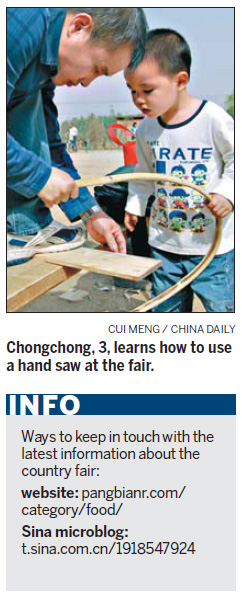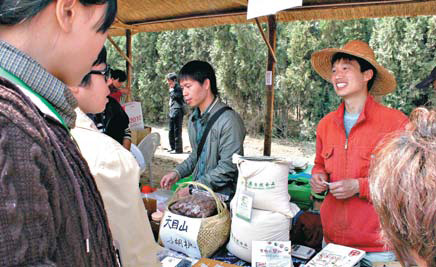Community
Farmers' fair a hit with those keen to eat green
By Wu Wencong (China Daily)
Updated: 2011-04-18 08:06
 |
Large Medium Small |

Two colorful scarecrows were carefully posed in the center of the school playground, a beacon for the enthusiastic buyers that swarmed around the booths of farmers from about 20 organic farms in Beijing.
All were eager to get their hands on the produce on offer at the Beijing Farmers' Market, which gives food lovers the chance to buy fresh local chemical-free vegetables and the opportunity to get to know the producers.
This was the fifth country fair and it attracted more than 2,000 consumers. The figure for the last fair, a month ago, was only 500.
"More people are coming each time. At first it was mainly foreigners, but we are beginning to see more Chinese people since the third fair at Renmin University of China," said Chang Tianle, project officer from the Institute of Agriculture and Trade Policy, one of the organizers of the fair.
"Farmers' fairs are an old tradition, where people can buy food and vegetables and come and make friends," Chang added.
The current series of country fairs was the brainchild of a Japanese artist named Emi Uemura.
Chang said the fair is very picky about the selection of the farms that will attend the fair. The food produced not only has to be chemical free, but also local.
"If you look at the problem of food security, aside from the industrialization of agriculture, another key problem is that the industrial food chain is too long to be tracked and monitored," said Chang. "Emphasizing food localization can help shorten the chain, which is a better solution to food security issues."
However, most of the farms attending the fair have not received official organic certification.
Most farms are too small in scale to apply for the certificate, which would raise the costs, said Chang.
But Michael Eddy, a Canadian artist and volunteer of Homeshop, another organizer of the fair, said they have checked the production process of every farm carefully.
"Everyone is welcome to go to the farms and get to know the farmers, and get some trust," he said.
"It's a way to make friends with people and learning about the production process is fun," said a farmer named Duan Qihuang at the fair.
Duan owns a 5.3-hectare farm in Shunyi district, where he sells all types of vegetables. He has attended all the fairs so far.
"I'm here to meet other organic farmers, friends of mine who share the same dream with me, to provide the people with safe and delicious food."
Wang Ruiqin, who is a white-collar worker in her 30s, bought the last three kilograms of Duan's vegetables. She said she admired the farmers.
"I admire their guts, devoting their time and money into it, and staying with it even when they are losing money," she said. Although supported by more and more consumers, the fair still faces many problems, not least finding the right location. "The ideal place should be somewhere close to the city center, an open space in summer, with kitchens to prepare the food and lots of parking places, and most of all free," Chang said.
She said the fact that such places are so hard to find is the reason that they can't set a fixed timetable for the fair and have to shift the location every time.
Eddy suggests that the authorities provide a specific location for the fairs now they are becoming popular.
China Daily
|
Farmers sell chemical-free produce to shoppers from all over the city at the Beijing farmers' fair. Michael Eddy / for China Daily |
(China Daily 04/18/2011)
| 分享按钮 |
